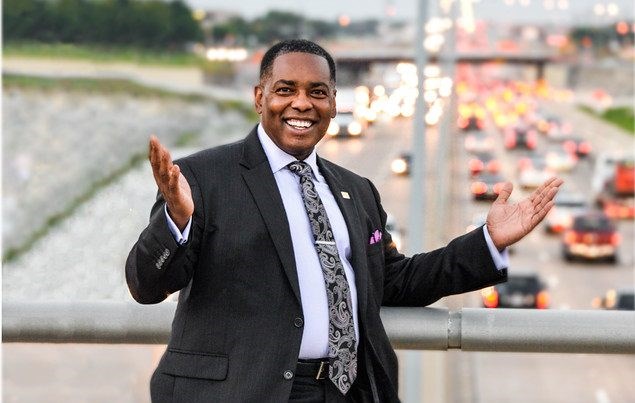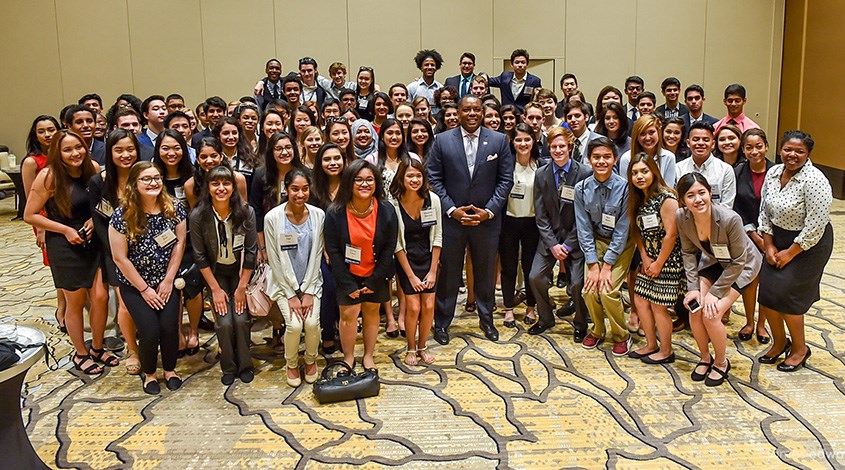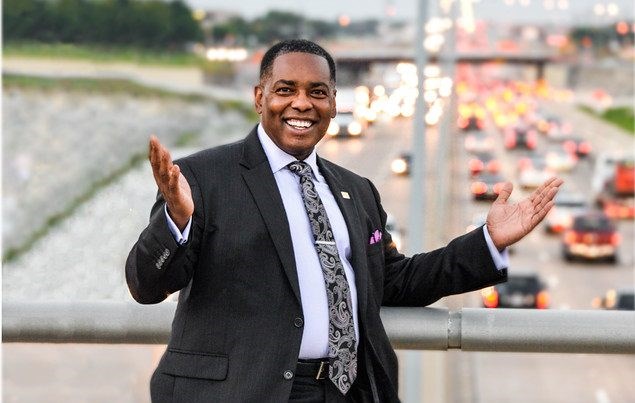 Mission: Possible
Mission: Possible
This is no spy thriller. This is Plano Mayor Harry LaRosiliere—unscripted.
We sat down with Plano’s chief ambassador to talk about why he took on this role, his journey thus far, and his vision for Plano 3.0.
Oh, and what our national leaders can learn from the City of Plano…
Any and every city needs a leader who can embrace change and forge ahead. But Plano is not just any city. Our population has more than tripled in the last three decades; we have an enviable school district (95% of our students attend college); we have an award-winning public safety department; and beautiful parks. Almost 45% of our population is non-Caucasian and 80 native languages are spoken in homes across Plano.
As Mayor Harry LaRosiliere puts it, we’ve gone from a bedroom community (Plano 1.0), to a suburb of Dallas (Plano 2.0) to a nexus of economic activity with global appeal (Plano 3.0). Each version is not a remake of the original, rather a sequel containing elements of Plano’s past, with a few of the same characters, and most definitely a different story. And like any sequel, subsequent works are influenced by the original narrative. Plano’s long history of dedicated City staff and volunteers laid a solid groundwork for today’s success. This is why Plano is not just any city. We have a rich history and foresee an even richer future.
Mayor Harry LaRosiliere is simply a man on a mission—or, as he says, a “calling”—to respect the values our city was founded on but forge ahead with Plano 3.0. Along with a charismatic personality, broad smile and fancy name (pronounced LA-ROSS-SILL-E-AIR), he has a supportive family: wife Tracy, and daughters Brianna, 19, and Maya, 17. As a father of two teenagers, we can safely assume he knows how to enforce, how to empathize and how to embrace multiple viewpoints to find common ground. And, let’s face it, if you know him or have seen him behind the mic, he’s jovial and spontaneous with a wit to boot.
Born in Haiti and raised in Harlem, Mayor Harry LaRosiliere was sworn in as Plano’s 39th mayor in May 2013, nearly 21 years after moving to Plano from New York. He and Tracy mainly relied on her salary so that he could start off as a financial advisor. It was a risky move but Harry credits Tracy for keeping him afloat. She encouraged him to pursue his talent “as long as you believe in yourself.”
LaRosiliere didn’t always know he was going to pursue a career in the financial services industry. He originally went to school to pursue civil engineering because he was “good with numbers,” and family influences told him that’s what he should be, but to put it simply, he didn’t like the coursework and couldn’t imagine doing something his whole life and not enjoying it. So, at a crossroads, he chose to pursue a topic that interested him, geology. He graduated with a bachelor’s of science in geology from the City College of New York in 1985.
LaRosiliere’s interest in civil service began after an incident on the busy streets of New York City. A man lost control of his car in the Crown Heights neighborhood, an area prevalently made up of Orthodox Jews. The Jewish man ran a red light and killed two African American boys. The tragedy sparked racial strife and LaRosiliere was disappointed in how Mayor David Dinkins—the first African American mayor of New York City—passively handled the situation.
LaRosiliere is a take-charge leader. Two of his initiatives are evident of that: The Food For Kids program and the Mayor’s Summer Internship program. (Read on for more).
He’s also behind (pending council approval) the first tax rate decrease in 15 years. He is proud that the plan also includes increasing services, specifically hiring 59 more public safety officers. He explained that the City is absorbing a 10% water rate increase, rather than the citizens shouldering the burden. So, when you account for the cost savings, plus a $1 cent tax rate decrease—which represents about $3.5 million of revenue annually for the City—it represents almost a $4-cent total decrease for the average Plano homeowner. Much of this is because of prudent financial management by City Council and City staff. LaRosiliere is most excited that new businesses moving to Plano like Toyota, JP Morgan and Liberty Mutual are not even reflected on the tax role until 2018 and beyond.
Keep reading to learn more about Plano Mayor Harry LaRosiliere and his vision for our vibrant city.
What’s your 30-second Plano pitch?
We’re a city 20 miles north of Dallas. We’re a globally diverse city; we have an abundance of educational and recreational opportunities for our citizens, and it’s a wonderful place to live, work and play. We have all the components of what makes a city great. It’s safe, great schools and has a lot of amenities to provide a high quality of life.
And business is booming.
Business is booming, absolutely!
Of your achievements in Plano what are you most proud of?
There are a couple of things that I’m really proud of. We get lot of accolades because of the economic development, but I’m most proud of two key community-based initiatives: Food for Kids, where we’re feeding up to 1,500 kids throughout the school district from the day school starts to the day school ends. And the Plano Summer Internship Program. In the past three years, we’ve given over 200 worthy youth an opportunity to work at a major corporation and grow beyond academics.
During your time as mayor so far, do you have any regrets in your policy-making?
I wouldn’t call them regrets. I have what I call the four L’s of leadership: Leaders Listen, Leaders Learn, Leaders Lead by Example and Leaders Let Go. Certainly, there are decisions or ways I went about things and when those situations come again, I’ll do things differently, but I think that’s part of the leadership process—taking action, sometimes taking risks, and realizing you could have done it better. So, I wouldn’t say I regretted anything, but I have learned quite a bit.
And what about the Letting Go part?
The Letting Go part is actually the hardest part. I think to truly be an effective leader, you have to let go and have faith—have faith in your God, have faith in your team, have faith in your destiny, have faith in your family and those around you—so that once you’ve put everything in place, you allow those around you to take action. …So often as leaders, we tend to want to hold onto things and make sure it goes exactly as we planned, but it doesn’t always work that way.
It can be a bit of a challenge. Speaking of challenges, planning for the future of the city, you have to address the immediate needs of the citizens. How do you find the right balance between the long-term and short-term needs and how do you create a plan of action around that?
That’s really one of the hardest things to do, providing the services and the amenities for today with the understanding that you are really governing for the future. It’s really allocating your resources in an effective manner, the City’s resources, so that those who are here today feel honored and respected, but also know that there’s an evolution that occurs naturally, and in order to be a vibrant and sustainable city, you have to be ready for the next 10 or 15 years. It’s a balancing act.
Plano 3.0. Paint us a picture.
Well, we’ve really just begun the era of Plano 3.0. Today, we’re a city of our own. We have all the amenities to compete on a global level for any business, family or individual. There are going to be some differences. We’re getting younger as a community. So, in order to remain a City of Excellence, we’ve got to provide the amenities for those folks that are coming in.
When you look at Plano today, what will continue in Plano 3.0?
One thing that I don’t believe will ever change is who we are as a core. We’re a big city but we’re also a strong community, and that sense of community is key for us to maintain. We’ve grown to be a city of about 275,000 in population. At build-out, we’ll top off at about 300,000 at the most. We’re the ninth largest city in Texas, so we’re not a small town anymore. But it’s important that we remain committed to our core values, which is that sense of community, doing things for each other.
The recent shootings in Dallas underscore the importance of integration across nationalities, races and religions. As Plano continues to grow, how can we maintain unity while enjoying diversity and all the benefits that come with it?
It starts with the acknowledgement that everyone matters. The U.S. Conference of Mayors participate once a year in a program called Everyone Matters Day, and it’s simply putting the awareness out that everyone matters. We go out to the schools and we have everyone say, ‘I am…’ and then they say what they are. It’s a way of fostering that awareness that everyone matters in Plano and that it’s up to us to deal with everyone on a very human level and realizing that our differences makes us stronger. We have a common base: the desire for safety, the desire for education for our children, and the desire for affordability—there’s comfort in that. And it’s willing to have the dialogue…to have those difficult conversations to get us to that other side.
[Pauses]
Easier said than done. [He laughs.]
It’s going to be an ongoing effort but from what we’ve seen from the community, it’s one that will be embraced.
We all have to accept personal responsibility to be the light in our world…in my case, the 72 square miles that we call Plano.
While Plano is really an incredible city, it still faces certain challenges, particularly in the areas of maintaining our outstanding level of education and addressing poverty and food insecurity, which you have taken on first hand with the Food for Kids program and the Mayor’s Summer Internship program, which tripled in size this year. How do you see these issues being addressed over the long term and do these programs provide you with a better perspective and ability to address these issues?
Food for Kids addresses a basic need for elementary school students, and the internship program addresses high school students—so they’re kind of book ending. There are a lot of nonprofits that do some of those things in between, but I think it’s the acknowledgement. Plano is one of the most affluent communities in America. The median income is over $80,000 per household versus $50,000, the national average. However, one-third of our kids are on a food assistance program. With Food for Kids, we’re feeding 1,500 kids that are chronically hungry. So we’re a microcosm of what’s going on in the United States. We have a lot at the top end and a lot at the lower end, and we have to lift that lower end to create that middle class and that support in between. If you don’t have that, the top collapses down. And it’s about having that sense of community and pitching in; everyone doing their part.

We still have a handful of people from the Plano 1.0 days…
[The mayor interrupts and laughs…] Some from Plano .5
Yes, and they’re still very active in the community and enthusiastic about what is happening, but we also have members that are apprehensive about changes that are coming. How do you go about assuring them that the very best elements of Plano will persist?
“…It’s not my desire or Council’s to change some of those things—safety, great schools, amenities, mobility, a sense of community. All those things are why I chose to stay [in Plano]. Most people have a similar story where they thought they were going to be here for a little while but planted their roots. There’s no reason to mess with success. The only thing is…the core of who we are stays the same. It’s up to us to respect our history but have an eye toward the future as well.
As mayor, how has your experience impacted you and your family on a personal and a professional level?
On a personal level, I have two daughters and there’s not a day they can remember that we have not been involved in community service on some level, so I feel good that I’ve passed that along to them. That’s part of who we are; that’s our responsibility. And I’m confident that as they move up in the world, they’re going to find their area of passion.
From a professional standpoint, I think I’m a better mayor today than I was three years ago—at least I hope so—and it comes back to that learning component of leadership. As individuals in all scopes of our lives, it’s important that you find a way to improve yourself. I’ve learned patience. I’ve learned to listen better, at least I think I have, and hopefully it’s made me a better community servant.
How do you find enough hours in the day?
My next ordinance is to add another two hours to the day. We’re going to go to a 26-hour day. [He laughs]
My life is a three-legged stool—family, work and community—and it’s important to balance that as best as I can. The foundation is my faith. I rest on that faith, but it’s important that I find the right balance, and it usually ends up being about 16- or 17-hour days.
We’ve been impressed seeing a functional city government, based on mutual respect, efficiency, and a genuine desire to do what is best for the citizens of the city. What must we do to ensure that this continues over the long term?
Plano has a history of service excellence. We call ourselves the City of Excellence, and the excellence that we deliver is in the service. It’s really just the culture here. It’s a desire to be the best at whatever we do…
The way we continue it is through citizen engagement. There’s a high level of engagement with our citizens, and when we know what they want, we’ll find a way to deliver that service.
While we in Plano almost take for granted what politicians can accomplish working together with its citizens, we are seeing very different conversations taking place on a national level. What lessons could our presidential candidates learn from how the City of Plano?
I think what they could learn is great things happen when the community comes together for a common cause. Our common cause is our children. Our commitment to our children is that our city will protect them (Plano is one of the safest cities in America), our schools will educate them (we easily have one of the most recognized school districts nationally) and lastly, our communities will nurture them (we’ve seen that through a number of initiatives when our corporate partners, faith-based organizations, nonprofits and individuals come together on behalf of our kids). If we have a common cause and it’s our children—our future—great things can happen.
Mayor Harry LaRosiliere, thank you for your time.
Thank you. I always like talking about my favorite topic. Plano, Texas—believe the hype!
Plano Mayor Harry LaRosiliere’s Favorites
Family activity?
To my wife’s disdain, watching “Love and Hip Hop” and with my daughters and goofing off on how unrealistic that reality show is.
Dish?
My mother’s red beans and rice, fried plantains and chicken. Best. Meal. Ever.
Restaurant?
I love all my restaurants equally.
Hobby?
Working out
Social media outlet?
Twitter
[Follow Mayor Harry LaRosiliere @planomayorharry]
Hashtag?
#planomayorsummerinterns
Mobile app?
The voice memo because when I’m driving, I use it to capture my thoughts.
Parenting tip?
Protect your brand. What I mean by that is, when I tell my children I’m going to do something, I’ll do it, whether they like it or not. My word is my bond. As a parent, and certainly as a father, there’s no honor or award for being a good dad, that’s just your responsibility.




